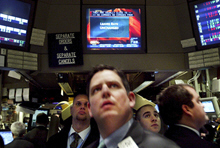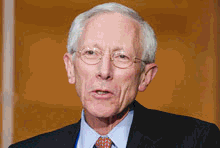
Typical street scene in Santa Ana, El Salvador. (Photo: iStock)
IMF Survey: Turmoil Could Prompt Markets Rethink
October 19, 2007
- "The first crisis of financial globalization and securitization"
- Regulators must address transparency, information to keep markets working
- Globalization has enabled "activities that the system cannot accommodate"
A panel of leading economists, speaking at the launch October 19 of a series of IMF-World Bank seminars, grappled with the implications of the financial market turmoil that began last summer for financial globalization, for the global financial system, and for the health of the world economy.

Seminar heard of uncertainty prompting sudden flight from risk that caused markets to seize up (photo: Chris Hondros/Getty)
PROGRAM OF SEMINARS
The panelists were in general agreement that the turmoil, with its roots in the U.S. subprime mortgage lending market, will require changes in global financial regulation. They debated whether the United States faces an economic slowdown or possibly even a recession. And if it were to head into recession, whether the rest of the world is sufficiently "decoupled" from the U.S. economy that global growth could continue with reduced demand from the world's largest economy.
The seminar on trends and challenges in globalization was part of four days of seminars organized together with the Annual Meetings of the IMF and the World Bank in Washington D.C.
Widespread effect
Nouriel Roubini, professor of economics and international business at New York University's Stern School of Business, called the meltdown in the U.S. mortgage market "the first crisis of financial globalization and securitization." When high-risk borrowers in California or Florida defaulted on their home loans, some investors as far away as Europe, Australia, and Asia who bought securities backed by pools of U.S. mortgages incurred losses.

Fischer: Source of financial turmoil is "very bad lending by those who originate mortgages" (IMF photo)
The source of the problem, as moderator and Governor of the Bank of Israel Stanley Fischer noted, "is very bad lending by those who originate mortgages." The mortgages were bought from the original lenders by securities firms that repackaged them into securities and sold them to other investors. It was suggested that at no step along the process did anyone until the final buyer look at the loans as portfolio investments. And there was virtually no public trading to validate the valuations assigned by credit rating agencies.
The full extent of the losses are still uncertain, as is the location of many of the securities. Larry Hatheway, chief economist at UBS AG, estimated that some $2 trillion in mortgages are at risk and that overall defaults could reach as high as $200 billion. That uncertainty from lack of transparency and information triggered a sudden flight from risk that caused markets to seize up.

Hatheway: Some $2 trillion in U.S. mortgages are at risk, overall defaults could reach $200 billion (IMF photo)
Almost all the panelists agreed that regulators will have to deal with issues of transparency and information to keep the markets working, including looking at the possibility that these complex and difficult-to-value instruments be traded on exchanges to increase liquidity and transparency. Roubini said the role of ratings agencies has to be evaluated as well.
Off-balance sheet vehicles
Some banks, often the buffer when credit markets dry up, played a role in the process, the panelists said. These banks were dealing in the mortgage-backed securities instruments themselves through off-balance sheet vehicles but they now have to bring those securities back to their balance sheets. This, coupled the propagation of market uncertainty, restricted the banks' ability to lend.
As the world assimilates the benefits and challenges of globalization and securitization, "we should expect more of what we witnessed this summer," said Mohammed A. El-Erian, president and CEO of Harvard Management Co. Because globalization has enabled "a whole host of activities that the system cannot accommodate," there will be "periodic episodes of market turmoil" in which liquidity "will stop overnight," much like the so-called sudden stops that characterized financial crises in emerging markets a decade ago.

El-Erian: There will be "periodic episodes of market turmoil" in which liquidity "will stop overnight" (IMF photo)
Still, he said, unless one of what he called "three circuit breakers" failed, these episodes will not derail globalization or growth. Those three circuit breakers are: central bank commitments to provide liquidity to the system; a large amount of capital that is still looking for investment opportunities; and a world economy that is relatively robust owing to the recent strength of many developed and emerging market economies.
U.S. remains key
The spillover effects on the real economy so far are most marked in the United States, whose consumers have been the most important driver of both domestic and global growth. Can the rest the rest of the world take up the slack if there is a U.S. slowdown or recession? "The direction of the world economy is still going to be decided by the U.S. economy," said Hiroshi Watanabe, special adviser to the president of the Japan Center for International Finance.

Watanabe: "The direction of the world economy is still going to be decided by the U.S. economy" (IMF photo)
Hatheway said that the size of the housing shock is likely to be the ultimate determinant of U.S. growth in the near term. His models show a one-in-three probability of a recession that could easily rise to 50 percent.
El-Erian said that that the world can continue to grow if there is a U.S. growth slowdown, but that the world won't "decouple" yet if there is a recession. He noted the growing contribution to world growth from other countries, most notably China and India, which has recently been greater than that of the United States. But to replace the U.S. consumer in world demand, these countries will need to shift from investing and exporting toward consumption.
Roubini's assessment was similar. If there is only a slowdown in U.S. growth, the so-called soft-landing scenario, then the rest of the world will continue to grow. A U.S. recession, however, would affect the rest of the world.

Roubini: U.S. "hard landing," recession more likely, which would affect rest of world (IMF photo)
But Roubini said a recession, the hard landing, is more likely. The housing sector is getting worse, removing both a source of income and confidence for consumers; gasoline and oil prices are rising; and fewer jobs are being created.
Confined to main markets
The panelists noted that this financial crisis has been confined to the world's most sophisticated financial markets—mainly in the United States and Europe, where several financial institutions that invested in securitized U.S. mortgages have had major difficulties. If that scenario holds, Fischer noted, there is likely to be little threat to financial globalization from the credit market turbulence and the spillover into the real economy.
The panel on the risks and prospects for global expansion was the first of several major seminars organized by the IMF and the World Bank as part of their 2007 Annual Meetings. Other seminars are examining income distribution issues in relation to globalization; the growing role of private equity and hedge funds in financial globalization; the market and policy implications of the recent problems with structured financial products; and the "new aid architecture" and the role of private aid donors, global health issues, and climate change.


